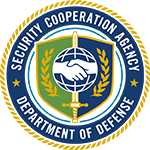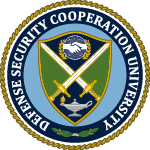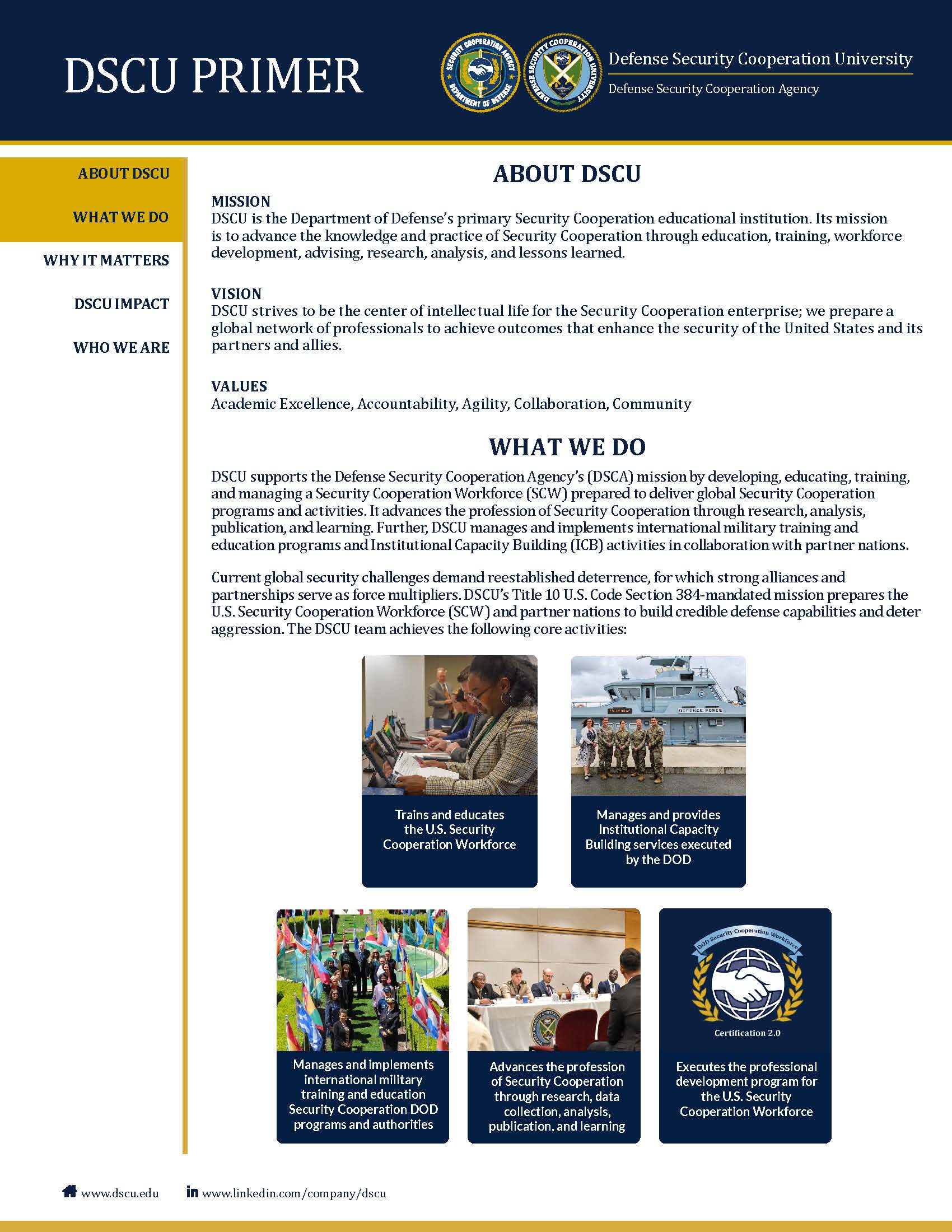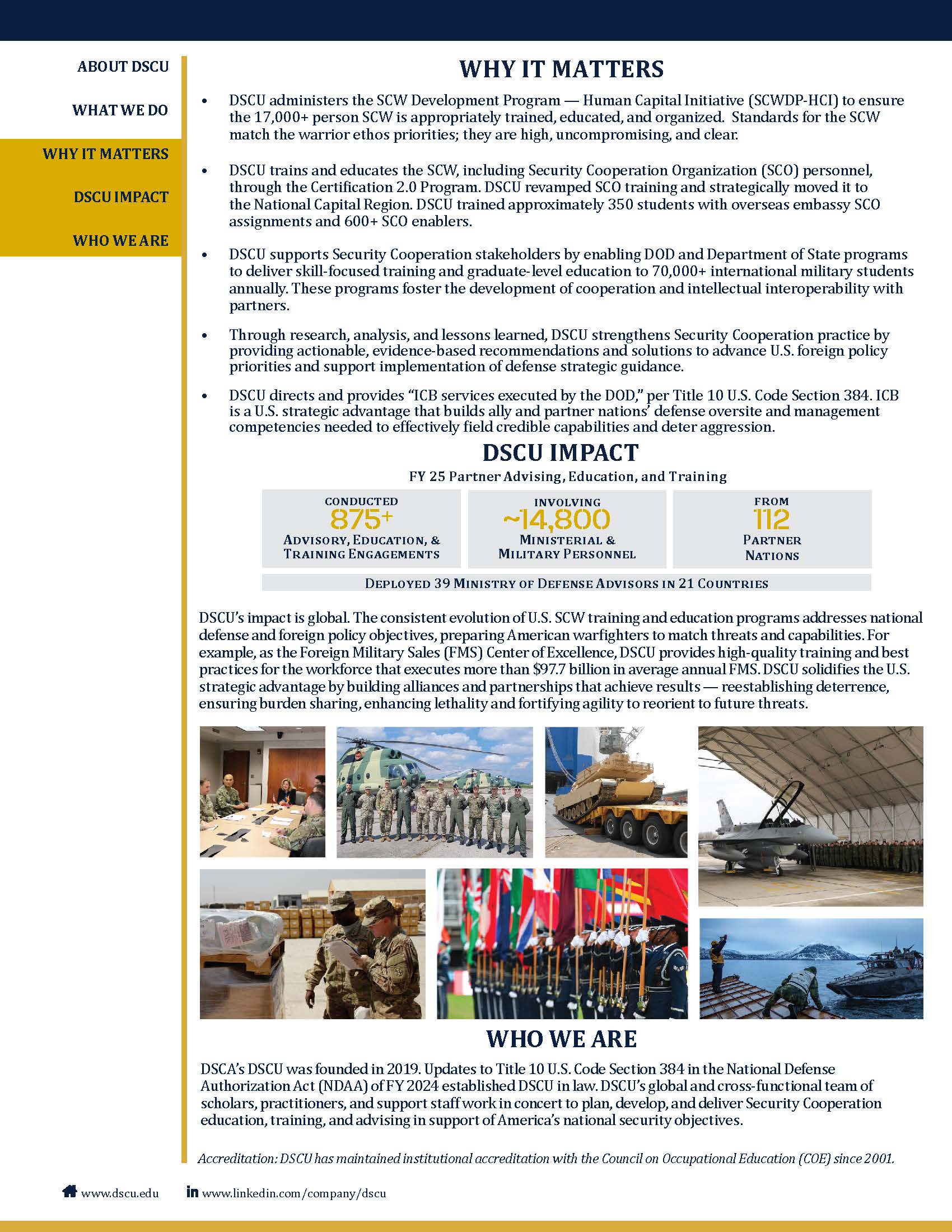DSCU Charter
Title 10 U.S. Code Section 384 tasks the development and promulgation of a charter for the operations of DSCU. The DSCU Charter details DSCU’s mission and associated structures and organizations.
History
To meet the requirements of the Fiscal Year (FY) 2017 National Defense Authorization Act (NDAA), the Secretary of Defense directed DSCA to establish the Security Cooperation Workforce Development Program and lead the Department’s education, training, and certification program per Title 10 U.S. Code Section 384. In September 2019, DSCA established the Defense Security Cooperation University (DSCU) and added the School of Security Cooperation Studies (SSCS) as a DSCU component to support the DSCA requirement to train, certify, and provide for the long-term development of the security cooperation workforce at home and abroad.
DSCU’s role was further expanded in April 2021 when the Institute for Security Governance (ISG), Defense Institute of International Legal Studies (DIILS), and other international training and education programs were brought under its umbrella, thus broadening the scope of the University to include program implementation. In FY 2023 DSCU established the foundation of the Defense Security Cooperation Service (DSCS); developed research, analysis, and lessons learned capabilities; and established the College of Strategic Security Cooperation as a DSCU component.
Recognizing the growing importance of security cooperation as a primary tool of policy, especially in the context of multiple global crises, Congress established DSCU in law and expanded DSCU’s responsibilities in updates to Title 10 U.S. Code Section 384 in the NDAA of FY 2024.
To meet its statutorily defined mission, DSCU: established the BG Charles Young Research, Analysis, and Lessons Learned Institute; created new curriculum and launched the Security Cooperation Workforce Certification 2.0 Program; established the Security Cooperation Workforce Development Program—Human Capital Initiative (SCWDP-HCI); developed the Defense Security Cooperation Organization (SCO) Institute (DSI); welcomed the Defense Resources Management Institute (DRMI) to the DSCA team as a component of DSCU; co-hosted the first Foreign Military Sales (FMS) Symposium; and DSCU implemented critical Institutional Capacity Building (ICB) activities around the globe via its ISG, DIILS, and Ministry of Defense Advisors. Additionally, DSCU is now legislatively charged with the management and implementation of international military training and education security cooperation programs and authorities executed by the DOD; management and provision of ICB services executed by the DOD; and advancement of the profession of security cooperation through research, data collection, analysis, publication, and learning.
Partnerships
Defense Acquisition University (DAU)
DAU is a modern learning platform delivering continuous learning and support tailored to the needs of the Defense Acquisition Workforce. Everything we do at DAU is for you, the acquisition professional — including formal courses in-person and online, events and workshops, job support tools, consulting and more. As your learning partner, we will be with you in the classroom, online, and in your workplace — whenever and wherever you need us. All of our learning assets are meant to help you develop and manage acquisition programs, projects, and systems that continue to make our nation's warfighters the best-equipped armed forces in the world.
Seal Symbolism
The shield, swords, and grid-lined globe are derived from the seal of the Defense Security Cooperation Agency (DSCA), Defense Security Cooperation University’s parent agency. These elements represent DSCA’s motto, “SECURITY THROUGH GLOBAL PARTNERSHIPS.” The two swords come together to represent strength through Cooperation among the Department of Defense’s academic institutions.
These institutions provide a robust learning environment to address the core needs of a professional Security Cooperation workforce. The lamp of knowledge, with its eternal flame, symbolizes the enduring value of the pursuit of knowledge while the laurel wreath signifies triumph in the achievement of academic excellence.




